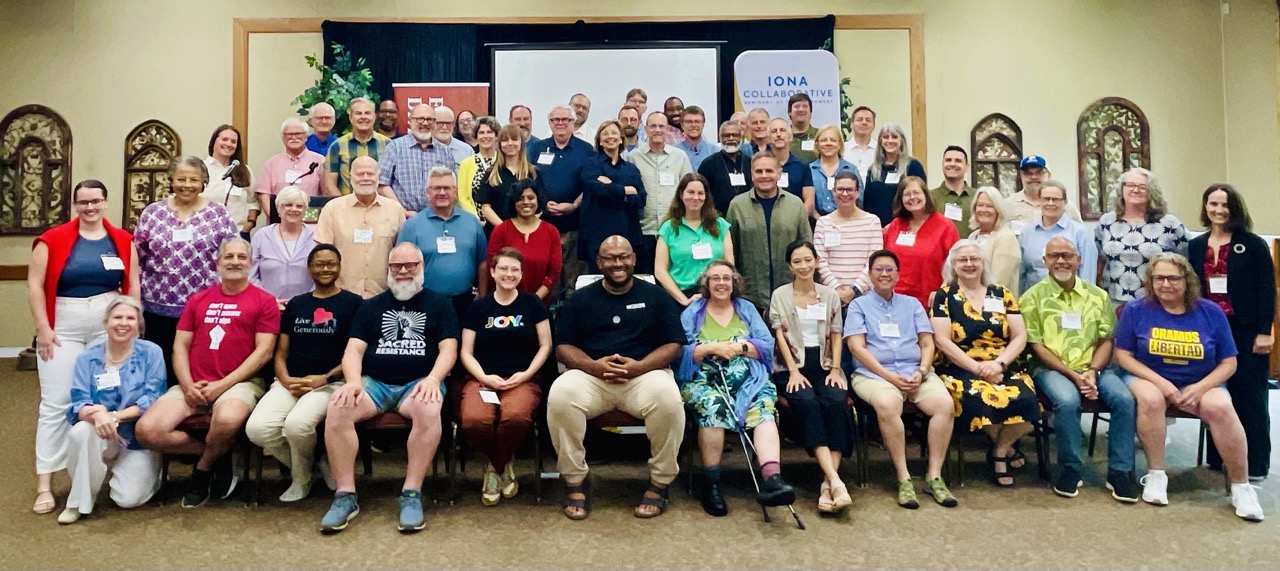On August 11-13, the Iona Collaborative joined forces with Episcopal Divinity School and Trinity Church NYC to host its biennial UnConference: a participant-driven conference experience that de-centers presentations by “experts” in favor of peer-to-peer collaboration on a given topic. This year’s theme was “Share and Share Alike?“ Real Talk about Resources. For three days, fifty-nine grant-makers, innovators, pastoral leaders, and educators from across The Episcopal Church and other mainline denominations engaged in structured conversations focused on the challenge of living more fully into a Gospel-centered economy of abundance. In this season of rapid change for the church, what kinds of resources could we be sharing more broadly? What practices might make sharing easier? What barriers to sharing do we need to address? Participants generated affinity groups and designed small experiments focused on more freely sharing money, expertise, curriculum, and innovation.
“The vision of the UnConference is not to lead with specific solutions to any of the many challenges facing the church today, but to experiment with processes we believe will strengthen our overall capacity for truth-telling, experimentation, and collaboration across difference,” said Iona Collaborative Director, Nandra Perry. “In that sense, even ‘failed’ experiments are a success if they teach us something new about how to work together.” In keeping with the emphasis on process, participants prepared for the in-person event by reviewing a recorded conversation on wealth distribution in The Episcopal Church featuring the Most Rev. Sean W. Rowe, Presiding Bishop, and Interim Executive Officer, Molly F. James. Attendees also took a self-assessment focused on conflict style, which was the centerpiece of an opening workshop on generative conflict facilitated by Dr. Ellen Ott Marshall, Associate Professor of Christian Ethics and Conflict Transformation at Candler School of Theology at Emory University. Days two and three featured opening panels to set the context for the day’s work and structured conversations to define terms, map assets, identify barriers, and draft experiments. The culminating workshop was a presentation from each affinity group on a proposed experiment designed to facilitate the sharing of a particular resource. These presentations were recorded and will be shared with the Presiding Bishop’s Office. A follow-up Zoom meeting to assess progress is planned for February 11, 2026.
“What made the UnConference so impactful was the incredible breadth and diversity of experience represented in the room. Every participant brought a unique perspective from small churches to large institutions, and the collaborative format allowed us to truly learn from one another. It was both humbling and energizing to be part of such a creative, resourceful group committed to reimagining how we share and steward resources across The Episcopal Church,” said Sean McConnell, Senior Director of Faith & Community Engagement for Episcopal Relief & Development.
“It was a gift to have this much wisdom and experience in a single room,” said Halley Ortiz, UnConference co-facilitator. “We’re grateful that so many people were willing to give their time and trust to participate in honest conversations about the difficult realities of sharing resources in the church. It is our hope that the relationships and networks built at the UnConference are only the beginning of a deeper and more fruitful dialogue.”

